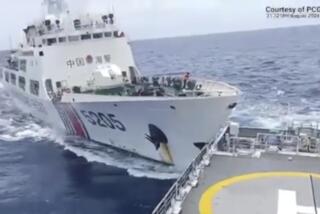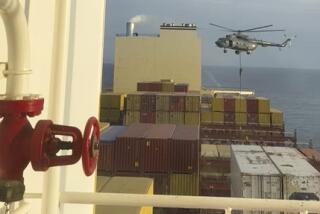Gorbachev Claims U.S. Worsens Gulf Tensions
- Share via
MOSCOW — Soviet leader Mikhail S. Gorbachev told President Reagan on Tuesday that a U.S. naval buildup is raising tensions in the Persian Gulf, and he renewed a proposal to remove all foreign warships from the area.
His statement came as American flags were raised on two re-registered Kuwaiti oil tankers waiting to enter the gulf with a U.S. Navy escort under Reagan’s controversial program to assert rights to free navigation in international waters and protect Kuwait’s ability to export its oil to mainly Western customers.
Gorbachev offered to discuss the withdrawal of U.S., Soviet and other foreign warships from the region in any forum. But that offer was quickly rejected in Washington, where White House spokesman Marlin Fitzwater said the Reagan Administration believes that the U.N. Security Council is the proper forum for dealing with the gulf conflict.
Meanwhile, a Soviet Foreign Ministry spokesman warned that the American naval escorts for reflagged Kuwaiti tankers “could become the detonator for a major conflict” in the gulf.
And the official news agency Tass accused the United States of using the naval escorts to mask “a large-scale military action spearheaded against the countries of the region.”
Announced at Press Briefing
The contents of Gorbachev’s reply to a letter from Reagan in connection with the Iran-Iraq War were announced by Boris D. Pyadeshev, a deputy spokesman for the Soviet Foreign Ministry, at a press briefing. He said Reagan’s letter was received several days ago.
The Kremlin chief welcomed Soviet-American cooperation in the U.N. Security Council, which adopted a resolution Monday night demanding an immediate cease-fire in the nearly seven-year-old Iran-Iraq War.
This “continuing senseless bloodshed,” Gorbachev wrote the President, is one source of mounting tensions in the gulf that are a matter of serious concern to the Soviet Union.
Gorbachev added, however, that “another cause of the mounting tensions in the gulf is the buildup of U.S. military presence” in the area, according to Pyadeshev.
His words then were reported by Tass in this way:
“Mikhail Gorbachev notes that some statements by representatives of the U.S. Administration seem to be evidence of the U.S. side’s interest in the Soviet proposals on the Persian Gulf” for withdrawal of foreign warships.
The Tass account continued: “If this impression is well-founded, we would be ready to discuss that issue with the United States more specifically in any format convenient for the President.”
Gorbachev’s letter closed on a conciliatory note, according to the official account.
“Mikhail Gorbachev stressed that he shares the idea in which Ronald Reagan ended his letter: When our countries decide upon acting jointly, the results will be there,” the Tass article said.
A separate Tass analysis, however, accused the United States of applying a double standard to the Iran-Iraq War and the deployment of American naval forces in the gulf.
It said there were nine U.S. warships in the gulf, with the aircraft carrier Constellation nearby and the battleship Missouri scheduled to join them in August.
“The concentration in the Persian Gulf and in the adjoining areas of a big naval and aviation force gives the lie to the claims by the U.S. Administration that its actions are not more than an operation of escorting Kuwaiti tankers,” the Tass analysis said.
“In real fact, this is a large-scale military action spearheaded against the countries of the region. The U.S. force has been ordered to open fire even with the slightest sign of the possibility of ‘hostile intentions,’ ” Tass added.
At his briefing, Pyadeshev said the Soviet Union believes the U.N. Security Council action is “very important” and priority should be placed on political measures in an effort to stop the war.
“Things would be very much facilitated if the United States accepted the Soviet proposal to remove all warships . . . from the area if the conflict could be stopped,” he added.
Peacekeeping efforts by U.N. Secretary General Javier Perez de Cuellar, the Soviet spokesman added, should receive priority at this time.
Asked about Soviet warships in the gulf, Pyadeshev said there were three minesweepers and one frigate there “to assure safe passage of Soviet ships.”
The Soviet Union agreed in April to charter three long-haul Soviet tankers to Kuwait and to protect them with four Soviet warships. This operation, which has been in effect for several months, came about after the United States learned in late February that the Soviet Union had offered to re-register five Kuwaiti tankers under the Soviet flag, according to a Pentagon chronology.
On March 2, Kuwait asked to put six of its vessels under the U.S. flag. The Pentagon said that on March 7, the United States offered to provide the U.S. flag for all 11 of the ships, an offer that Kuwait accepted three days later. It was then that the Soviet Union agreed to charter its ships to Kuwait.
Times staff writer Norman Kempster, in Washington, also contributed to this article.
More to Read
Sign up for Essential California
The most important California stories and recommendations in your inbox every morning.
You may occasionally receive promotional content from the Los Angeles Times.













